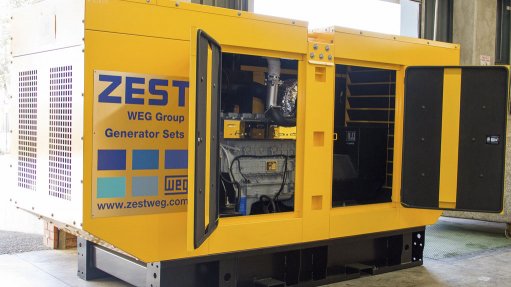
CUSTOM GENSETS Custom generator options offer creative solutions, complemented with aftermarket service
Electrical equipment supplier and manufacturer Zest WEG Group has added adequate filtration on the inlet- and combustion-air side of its diesel generators to ensure that they can withstand harsh environments.
Zest WEG Group currently has a canopy generator running in a pilot project at a waste plastics facility belonging to the City of Cape Town.
“The environment in which the Zest WEG diesel generator operates is not clean, and uses cracked oil to operate in the testing setting. The pilot plant converts 500 kg of waste plastic into 500 ℓ/d of heating oil using Japanese pyrolysis technology – a higher-end waste-to-energy technology used for waste minimisation. A portion of the oil is used to power the generator, while the rest is available for sale as heating oil in industrial processes,” says Zest WEG Group Generator Sets division COO Louis Kotze.
He adds that some of the testing environments in which the diesel generators are operating are in the mining sector where small amounts of airborne dust could cause catastrophic engine failures.
Wastewater treatment plants are another challenging area where issues such as corrosion need to be taken into account. Kotze says Zest WEG diesel generators have performed well in this sector which is critical, given the power constraints that have affected operations in South Africa in recent years.
Kotze reiterates that, while standby generators ensure critical backup supply, standby power solutions are also an important capital expen-diture decision, which needs to be considered carefully in terms of a company’s overall requirements.
He adds that Zest WEG Group Generator Sets division can offer customised solutions to industrial and strategic, as well as critical, applications, such as hospitals, clinics and old age homes, where lives depend on backup electrical power.
“Standby diesel generators are vital for busi-nesses that have process plants or are involved in production. “Wastage of product in the production pro-cess, when a power outage occurs, usually outweighs the cost of a generator over time,” Kotze elaborates.
Moreover, he notes that Zest WEG Group Generator Sets division regularly receives enquiries for the standard sound-attenuated weatherproof canopy generator sets – which range from 11.5 kVA to 275 kVA – and generators that are built to specification. Custom generator options include solutions such as open plant room-type, weatherproof canopy sets or containerised diesel generators, which offer creative solutions, complemented with aftermarket service.
The group, which also supplies WEG alternators, switchgear, electric motors and in-house panel builds, manufactures and assembles the products in Cape Town and carries stock at branches across the country.
“We use engines from original-equipment manufacturers globally, while WEG Brazil supplies and develops the generator alternators, as well as generator switch gears,” Kotze notes.
Zest WEG Group Generator Sets division supplies a large number of bespoke generator-set solutions, based on the specific application and environment in which they operate, such as those supplied to the V&A Waterfront and the tallest skyscraper in the central business district, the Portside building, both in Cape Town.
“We are currently involved in a number of tenders, which are in adjudication with various clients and consulting engineers. “These include the Cape Town International Convention Centre, hotel, gaming and entertainment group Tsogo Sun, fish producer I&J and the engineering division of State-owned freight transport company Transnet,” Kotze states.
Meanwhile, Zest WEG Group has noticed the global trend of moving towards cleaner forms of energy. These include the use of solutions such as inverters, photovoltaic systems and wind turbines.
Kotze, however, adds that inverters do not fulfil the same function as generators do mainly because inverters with battery bank solutions add to the load when the utility power returns.
Owing to this, Kotze notes that research and development remains a creative process, which has enabled the company to investigate and analyse demands by the industries in which the diesel generators function.
“Zest WEG’s product offering remains an ongoing development. The experience gained by tendering for specific projects has enabled Zest WEG Group to provide a range of quality diesel generator solutions and electrical products that can withstand harsh African operating conditions,” concludes Kotze.